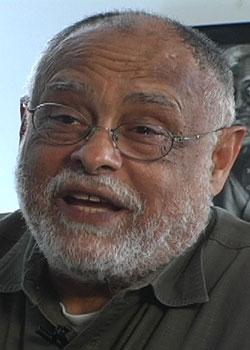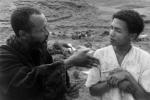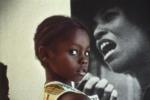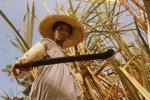You are here
Haile Gerima

Haile Gerima is an independent filmmaker and professor of film at Howard University in Washington, D.C. Born and raised in Ethiopia, Gerima emigrated to the United States in 1967. Following in the footsteps of his father, a dramatist and playwright. Gerima studied acting in Chicago before entering the UCLA School of Theater, Film and Television, where his exposure to Latin American films inspired him to mine his own cultural legacy. After completing his thesis film, Bush Mama (1975), Gerima received international acclaim with Harvest: 3000 Years (1976), an Ethiopian drama that won the Grand Prize at the Locarno film festival.
After the award-winning Ashes & Embers (1982) and the documentaries Wilmington 10—U.S.A 10,000 (1978) and After Winter: Sterling Brown (1985), Gerima filmed his epic, Sankofa (1993). This formally ambitious tale of a plantation slave revolt was ignored by U.S. distributors, but Gerima tapped into African American communities, and booked sold-out screenings in independent theaters around the country.
In 1996, Gerima founded the Sankofa Video and Bookstore in Washington, DC., a cultural and intellectual space that offers opportunities for self-expression, interaction, discussion and analysis through community events such as film screenings, book signings, scholar forums and artist showcases. Gerima continues to distribute and promote his own films, including his most recent festival success, Teza (2008), which won the Jury and Best Screenplay awards at the Venice Film Festival. He also lectures and conducts workshops in alternative screenwriting and directing both within the U.S. and internationally.
Filmography
| Film | Role(s) | Year | |
|---|---|---|---|
 |
Hour Glass A young African-American man rethinks his role as a basketball player for the white establishment as he reads the works of Third World theoreticians, such as Franz Fanon, in Haile Gerima’s “Project One” film. |
Director Producer Writer Cinematographer Editor |
1971 |
 |
Child of Resistance Inspired by a dream Haile Gerima had after seeing Angela Davis handcuffed on television, Child of Resistance is an abstract and symbolic film that follows a woman imprisoned as a result of her fight for social justice. |
Director Producer Writer Editor |
1972 |
 |
Bush Mama Bush Mama is Haile Gerima's powerfully moving look at the realities of inner city poverty and systemic disenfranchisement as experienced by Dorothy, a pregnant welfare recipient in Watts, played by the magnetic Barbara O. Jones. Motivated by the incarceration of her partner T.C. (Weathers) and the protection of her daughter and unborn child, Dorothy undergoes an ideological transformation from apathy to action. |
Director Producer Writer Editor |
1975 |
 |
Harvest: 3,000 Years Haile Gerima’s first feature work set in Africa employs visions of his native Ethiopia to construct a post-colonial allegory of class exploitation. Depicting a peasant family toiling under a wealthy feudal landlord, the film blends numerous narrative techniques to create an impassioned work of haunting beauty. |
Director Producer Writer Editor |
1976 |
 |
Ashes & Embers Nay Charles is an African American Vietnam veteran who no longer fits in, can’t find a job and is ultimately arrested by the police. Like his protagonist, Haile Gerima is both drawn to and skeptical of the black nationalist ideology. Finally, Gerima places his faith in African American youth, a vision of utopia after the grim lessons of contemporary race relations in America. |
Director Producer Writer Editor |
1982 |
 |
Sankofa Haile Gerima’s American masterpiece has had a transformative impact on audiences. The film follows Mona, an African American model on a fashion shoot in Ghana who undergoes a journey back in time and place to a slave plantation in North America where she becomes Shola, a house slave. Through this process, Mona recovers her lost slave identity and confronts her ancestral experience. |
Director Producer Writer Editor |
1993 |
To report problems, broken links, or comment on the website, please contact support
Copyright © 2025 UCLA Film & Television Archive. All Rights Reserved






 Mobile Navigation
Mobile Navigation

